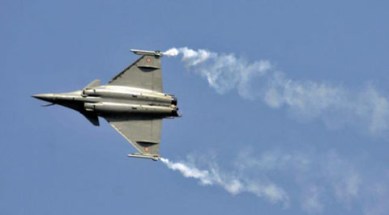Stay updated with the latest - Click here to follow us on Instagram
What the Rafale deal means for India, the way forward
The ostensible reason for India starting a separate process, away from the 126 aircraft deal, is to urgently meet the “critical operational necessity” of the IAF.

During Prime Minister Modi’s visit to France this week, India sought supply of 36 Rafale fighter jets in “fly-away” condition. This is under a government-to-government deal, unlike the tender currently being negotiated by the Ministry of Defence with Dassault, Rafale’s manufacturer.
[related-post]
The ostensible reason for India starting a separate process, away from the 126 aircraft deal, is to urgently meet the “critical operational necessity” of the IAF.
Dr Iskander Rehman, Paris-based non-resident Fellow in the South Asia Programme at the Atlantic Council says, “I can only imagine the collective sighs of relief at this announcement, not only among the French employees of Dassault, but also within the IAF, which has repeatedly expressed its concern over the steady haemorrhaging of the Indian air fleet. This acquisition couldn’t have been more pressing in nature.”
The bold political call taken by the Indian government is also a reflection of the frustration on both sides at how bogged down the deal has got in terms of procedures and pricing negotiations. As it is a government-to-government deal, India should be able to get these aircraft cheaper. The negotiations over price are still on but experts estimate at least a 10% lower price for these 36 aircraft. With limited funds available for capital acquisition in the defence budget, monetary considerations are an important factor in any major Indian procurement.
The announcement, however, doesn’t talk about making Rafale in Hindustan Aeronautics Ltd (HAL), a core proposition of the original tender. This multi-billion dollar procurement thus runs contrary to Prime Minister Narendra Modi’s Make in India plan for the defence sector.
This has led to whispers of some other high-end defence technology transfers from France as a quid pro quo for this deal. One such technology being spoken about is the reactor for the Ship Submersible Ballistic Nuclear (SSBN)
Submarine. India is currently in the process of making its first indigenous nuclear submarine, the Arihant. A nuclear submarine is seen as the best guarantor for a second strike capability in case of a nuclear conflict because it can stay underwater for longer periods than a diesel submarine, which needs to come to the surface for oxygen intake.
Speculation aside, there are doubts that France will part with such technology.”India badly needs help perfecting its SSBN reactors, but something tells me that that technology is way too sensitive for the French to part with it, even if India tries to strongarm them over the Rafale deal,” a French military analyst told The Indian Express.
Air Vice Marshal Manmohan Bahadur (retd), Distinguished Fellow at the Centre for Air Power Studies suggests a way in which the current deal could help the Make in India programme in the defence sector. The Maintenance Transfer of Technology (MTOT) for these 36 Rafale fighters should go to a private vendor instead of HAL. The DPP (2013 revised) clearly specifies that nomination of DPSUs like HAL for MTOT can be done away with and the contract given to a private vendor.
“We have so far not leveraged the MTOTs. If we give the Rafale MTOT to a private player, positive spin-offs will happen as it will expose that vendor to R&D and modern technology,” AVM Bahadur said.